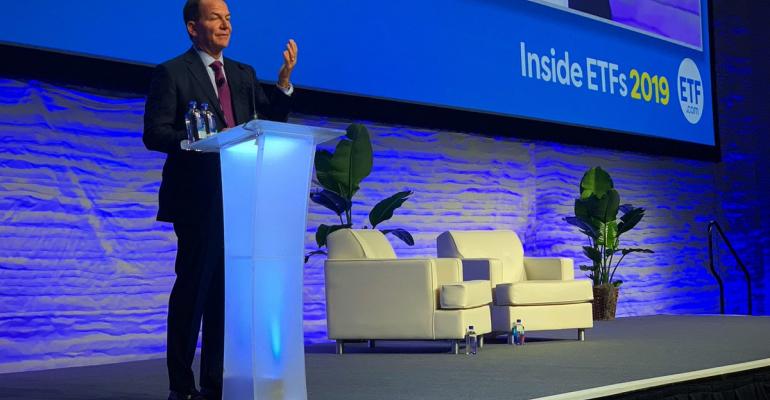Paul Tudor Jones II, the billionaire investor, told a crowded room of asset managers and financial advisors at the Inside ETFs conference that the system that got them there—capitalism—is broken and in need of reform. And he’s got an index of stocks that can help.
Jones, founder of hedge fund Tudor Investment Corp., which manages some $7 billion in assets, has a net worth of $5.1 billion, according to Forbes, primarily by making big bets on interest rates and currencies.
He said that private enterprise's relentless focus on profitability was creating distortions all over the world. “The primacy of profits for executives comes at a great cost to all other stakeholders,” he said, including a firm’s employees, consumers and the environment.
The economist Milton Friedman got it wrong when he said a firm’s business is to maximize profits, Jones said. A firm that focuses on profits above all else “is not sustainable.” Consider the growing level of income inequality and all the social distortions that come with it—populism, disgruntled low-skilled workers, displacement. According to the Economic Policy Institute, American workers saw pay gains since 1978 of 11 percent, adjusted for inflation. CEOs? 937 percent increase, a 70 percent faster pace than the stock market.
“The greater income disparity, the more members of society distrust other members of society,” he said.
Jones’ solution is to use capitalism to save itself. His nonprofit, Just Capital Foundation, formed with personal transformation guru Deepak Chopra, surveys 80,000 Americans on the values of corporate behavior that are important to them (little surprise, maximizing profits is way down the list) and then maps those priorities onto publicly traded companies. The result is a list of “just” firms, earning them bragging rights, a Good-Housekeeping-type seal of approval and publication in Forbes (Microsoft tops the list. Over 20 percent of the firms in the index are technology companies.)
The next step was to put those companies into an index and launch, with Goldman Sachs Asset Management, an ETF with the ticker JUST.
According to Jones, the companies in the index hire workers at a 27 percent greater rate than others; their median employee pay is 2.7 percent more, they recycle nine times as much and paid 60 percent fewer worker safety fines—in short, the index is meant to include good corporate citizenship, beyond financial performance.
For Jones, being on that list will not only reflect a more sustainable corporate governance but also attract capital through ETFs like his, as well as earn good PR, and that will prompt other companies to follow suit.
“We use capitalism itself to effect the change,” he said. “The only way we are going to do it is through the private sector. That’s the reason we founded Just, to shift capitalism to a more sustainable path."
“All change comes about because of peer pressure,” he said. “That’s why we are going to change, hopefully, this maniacal focus on profits.”
The 20-basis-point fee ETF was launched in June of last year and has $200 million in assets under management.
READ MORE COVERAGE FROM THE INSIDE ETFS CONFERENCE





